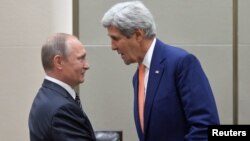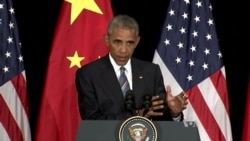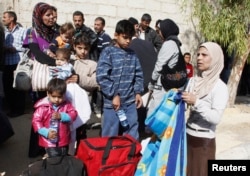Secretary of State John Kerry has returned home empty handed, failing to have reached an accord with his Russian counterpart on a cease-fire in Syria after an intensive period of diplomacy.
The two countries still need to resolve what are described as "technical issues," and discussions between American and Russian negotiators are set to continue this week, State Department officials said Monday.
Off to the side of the G-20 Summit in Hangzhou, China, the U.S. and Russian presidents held talks about Syria that Barack Obama described as "businesslike" and "constructive, but not conclusive."
"Given the gaps of trust that exist, that's a tough negotiation and we haven't yet closed the gaps in a way where we think it would actually work," the U.S. president told reporters at the conclusion of the G-20 summit.
Ongoing negotiations
Obama added he had instructed Kerry, while Russian President Vladimir Putin had told his foreign minister, Sergey Lavrov, “to keep working at it over the next several days” in hopes an agreement could lead “to a serious conversation about a political solution to this problem” with all parties directly or indirectly involved in the Syrian conflict.
WATCH: Obama on US-Russia discussion on Syria
Putin told reporters at a separate news conference that talks with the United States and Turkey were continuing concerning Syria and negotiators had made a step forward.
During the past 10 days, a peripatetic secretary of state kept in touch with Russian Foreign Minister Lavrov through face-to-face meetings in Geneva and Hangzhou and telephone conversations in between, while the American senior envoy made stops in Bangladesh and India.
Kerry and senior aides have reiterated they do not want to make a tenuous deal for the sake of an announcement, but rather want Washington and Moscow to agree upon something realistic to achieve a sustainable nationwide cessation of hostilities in Syria.
There is a growing perception among some senior U.S. officials, however, that the Russians are gaming the Americans in the talks.
In private, U.S. diplomats have characterized the negotiations with their Russian counterparts as a litmus test on whether there is a seriousness by Moscow to reach an accord, or if the Russians are buying time that results in Obama and Kerry being portrayed as hapless negotiators.
“The Russians walked back on some of the areas we thought we were agreed on,” a senior State Department official said Saturday, revealing the level of frustration.
Russia is a long-time backer of Syria, and is seen as desiring President Bashar al-Assad remain in power in Damascus to maintain Moscow’s influence in the region.
Shifting alliances
Diplomats have no illusion that bringing an end to five years of intense misery for the Syrian people will be easy. They describe the battlefield as complex, with shifting alliances among the many militias involved.
“There are five different wars being waged” in Syria is a characterization expressed by more than one person involved in the cease-fire talks.
President Tayyip Erdogan of Turkey, which hosts 3 million Syrian refugees, said he had reiterated to Obama and Putin at the G-20 talks in China the need for a “no-fly zone” over Syria and a “safe zone” where there would be no fighting, in hopes of stemming the human migration.
A half decade of war has fractured Syria. More than 250,000 people are believed to have died from shootings, mortar fire and air strikes. Millions have fled the country. And 18 million more people remain to face an uncertain fate, most of them in need of humanitarian assistance, according to UN relief agencies.


















